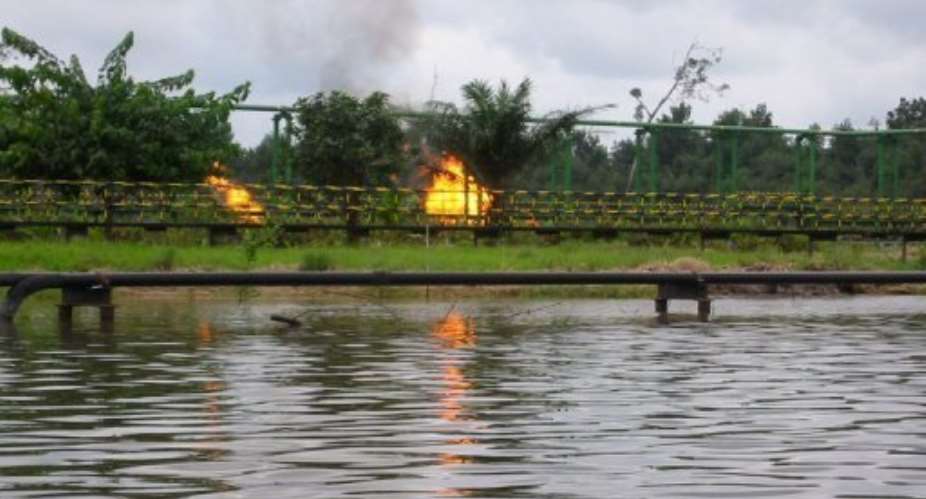LAGOS (AFP) - Oil giant Shell on Monday raised alarm over "unprecedented" oil theft in Nigeria, particularly related to the sabotage of one of its key pipelines, and called for urgent action to address the problem.
The comments are the latest from the industry over the problem of oil theft, which has been estimated to cost Nigeria, Africa's biggest oil producer, some $6 billion per year.
"We have now witnessed a significant upsurge in the activities of crude oil thieves," Mutiu Sunmonu, managing director of Shell's Nigeria division SPDC, said in comments distributed by the company.
"The situation in the last few weeks is unprecedented. The volume being stolen is the highest in the last three years -- over 60,000 barrels per day from Shell alone."
The Anglo-Dutch company, Nigeria's biggest producer, said in a statement that its key Nembe Creek Trunkline in the country's south had been hit repeatedly between February 22 and 25, causing temporary cuts of 150,000 barrels per day.
Nigeria currently produces around 2.0 million barrels per day, but suffers widespread spills due to pipeline sabotage.
Sunmonu said he could not rule out shutting down the pipeline if such activity continued.
"It is very clear to me that this is not just an act by desperate individuals trying to make a living," he said.
"This certainly is a well-funded criminal activity, probably involving international syndicates. I really want to put it to you that we are in a crisis."
The company said affected flowstations producing into the pipeline were now back on line, but that the threat of more sabotage remained.
Shell said the sabotaged pipeline was replaced in 2010 at a cost of $1.1 billion, adding that the new line had been repeatedly targeted by crude thieves since it was commissioned.
Sunmonu said "this is something which I worry is beyond the capacity of any individual company or beyond the capacity of a country to solve. We really need concerted efforts nationally, locally and internationally to actually get this under control."
A 2009 amnesty deal led to a sharp decline in unrest in the oil-producing Niger Delta region, but criminal activity has since flourished.
While Shell blames most of the spills on sabotage, activists argue that the company does not do enough to prevent such incidents and effectively clean up the damage when they do occur.
A landmark report from the UN's environmental agency in August 2011 said decades of oil pollution in the Ogoniland region of the Niger Delta may require the world's biggest clean-up.





 We’ll no longer tolerate your empty, unwarranted attacks – TUC blasts Prof Adei
We’ll no longer tolerate your empty, unwarranted attacks – TUC blasts Prof Adei
 Bawumia donates GHc200,000 to support Madina fire victims
Bawumia donates GHc200,000 to support Madina fire victims
 IMF to disburse US$360million third tranche to Ghana without creditors MoU
IMF to disburse US$360million third tranche to Ghana without creditors MoU
 Truck owner share insights into train collision incident
Truck owner share insights into train collision incident
 Paramount chief of Bassare Traditional Area passes on
Paramount chief of Bassare Traditional Area passes on
 Two teachers in court over alleged illegal possession of BECE papers
Two teachers in court over alleged illegal possession of BECE papers
 Sunyani: Victim allegedly shot by traditional warriors appeals for justice
Sunyani: Victim allegedly shot by traditional warriors appeals for justice
 Mahama vows to scrap teacher licensure exams, review Free SHS policy
Mahama vows to scrap teacher licensure exams, review Free SHS policy
 Government will replace burnt Madina shops with a new three-story, 120-store fac...
Government will replace burnt Madina shops with a new three-story, 120-store fac...
